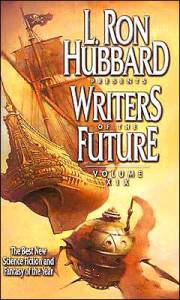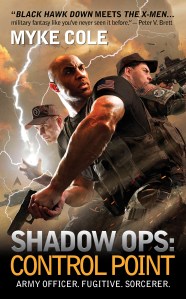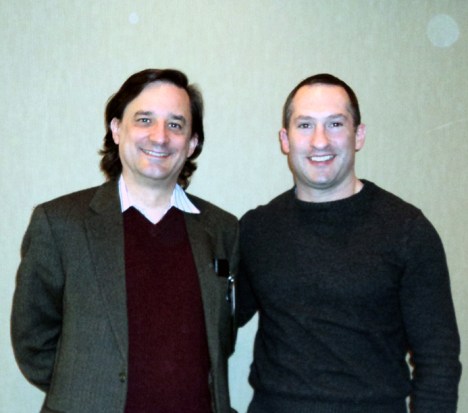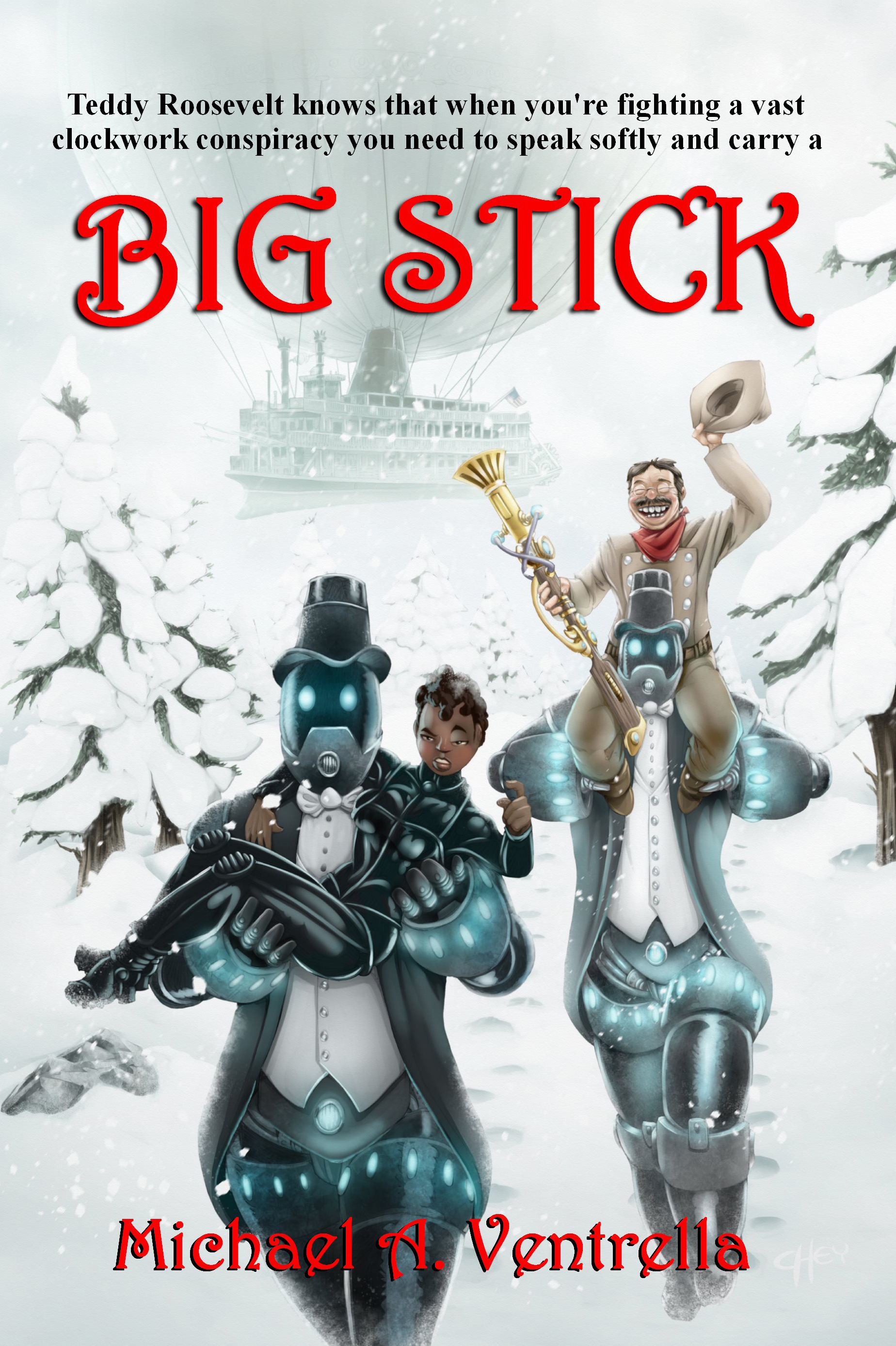MICHAEL A. VENTRELLA: I’m pleased to be interviewing author Myke Cole, who constantly upstages me whenever we’re on a panel together at a convention.  As a security contractor, government civilian and military officer, Myke’s career has run the gamut from Counterterrorism to Cyber Warfare to Federal Law Enforcement. Thank goodness for fantasy.
As a security contractor, government civilian and military officer, Myke’s career has run the gamut from Counterterrorism to Cyber Warfare to Federal Law Enforcement. Thank goodness for fantasy.
Myke, let’s start with the big news about your latest book FORTRESS FRONTIER. Give us a hint of what it’s about.
MYKE COLE: FORTRESS FRONTIER is the second book in my SHADOW OPS military fantasy series. It tells the story of a military bureaucrat suddenly forced to take command of a combat outpost against hopeless odds. The book explores the question we all ask ourselves: how would I stand up in a crisis? What would I do if I were truly tested?
Oscar Britton, the main character in CONTROL POINT (SHADOW OPS #1) is a character in FORTRESS FRONTIER, but not the protagonist. I always intended to use a ensemble cast in this series, and FORTRESS FRONTIER is the first step in that direction.
VENTRELLA: How are you promoting it?
COLE: The same way I promoted CONTROL POINT: I’m carpet bombing the Internet with guest blog posts, interviews, giveaway contests and excerpts. I just put out a book trailer. I’m getting out to cons as much as I can. I just got back from Confusion, and I’ll be hitting Boskone and Lunacon in the next two months.
But the biggest thing I’m doing? Not being a dick. I don’t bear-bait or take polarizing stances in public. I don’t tear other people down. I respond to my fans when they email or @ me. I have adhesive backed bookplates that I can sign and send to people if they want an autographed copy of my work, but don’t want to pay the high price of shipping a book back and forth. I generally try to be accessible, available and kind to people, whether they’re industry pros, personal friends or fans I’ve never met before. That’s rarer than you’d think, and it goes a long way.
VENTRELLA: Tell us about the Shadow Ops series.
COLE: Peter V. Brett described it best when he called it “Blackhawk Down meets the X-Men.” It’s as honest a look I can provide into how the US military would deal with the existence of magic. It deals with some tough issues like the conflict between liberty and security in a free society, but it’s also crammed full of giant explosions and helicopter gunships squaring off against rocs. Win-win, if you ask me.
VENTRELLA: Do you have a set series in mind? In other words, do you have a plan for a specific number of books in the series?
COLE: I’m under contract for 6 books right now. BREACH ZONE will complete the arc of this particular story, but the other 3 will also be SHADOW OPS books.  Books 4 and 5 will be prequels, taking place in the early days of the Great Reawakening before CONTROL POINT. Book 6 will follow an ancillary character from FORTRESS FRONTIER on his own adventure.
Books 4 and 5 will be prequels, taking place in the early days of the Great Reawakening before CONTROL POINT. Book 6 will follow an ancillary character from FORTRESS FRONTIER on his own adventure.
After that, I’ll take a look at the state of publishing and book selling, see how fans are reacting to my work, and decide where to go next.
VENTRELLA: I have to admit that “military fantasy” is a genre with which I am unfamiliar. Was that a hard sell to agents and editors?
COLE: I only ever tried to sell it to one agent – Joshua Bilmes. He has been a dear friend for over a decade now, and from our first conversation, I knew he was the only person in the world I wanted to represent me. He rejected 3 novels from me over 7 years before finally agreeing to represent CONTROL POINT, and a lot of people suggested I try other agents. But I never did. It was going to be Joshua, or it was never going to be.
Editors were a different story. They did balk at a blending of two genres that appeal to disparate audiences. When CONTROL POINT went out to market, it garnered rejection after rejection, many with comments like, “the story seems unsure of its voice.” I had almost given up hope when Anne Sowards made the offer.
VENTRELLA: How did you obtain Joshua Bilmes?
COLE: How did I “obtain” him? That makes it sound like I have him trussed up in my desk drawer. I knew of Joshua by doing research on who was representing authors I admired. I then deliberately sought him out at a SFWA party at Philcon in 2003. Fortunately, we hit it off amazingly, stayed up talking until 3 AM, and have been close friends ever since. As I said earlier, Joshua rejected 3 novels over 7 years from me. All that time we were visiting one another (I lived in DC at the time), exchanging phone calls and emails. The friendship was always separate from our business relationship.
But, ultimately, how did I “obtain” him? I wrote a good book and sent it to him. That’s the only way anyone ever gets an agent. There is no end run.
VENTRELLA: It appears that you started off, like me, writing mostly nonfiction. Do you feel that the skills learned in writing nonfiction are comparable to writing fiction?
COLE: In the bones, sure. Good nonfiction requires solid prose styling and feel for rhythm, the beats of your sentences. You have to be interesting and construct a narrative in essays just as much as in fiction.
The real difference for me is in Law-Enforcement/Military/Intelligence writing (reports, orders, plans, analysis, etc) that is a totally different animal.
VENTRELLA: What was your first published piece of fiction and how did you get that published?
COLE: Let’s talk about the first piece of fiction I had professionally published. That would be “Blood and Horses,” a military SF short that took 3rd in the Writers of the Future contest and was published in Vol. XIX.  I did it the old fashioned way, I entered a story every quarter, without fail, for 5 years.
I did it the old fashioned way, I entered a story every quarter, without fail, for 5 years.
Now, it was a great experience and there’s no doubt that it launched my career. I learned a ton out in LA, developed some critical contacts, and got the shot in the arm I needed to keep going. Unfortunately, I later learned that the contest is not firewalled from the Church of Scientology, and there are personal and financial ties there. I certainly won’t judge the beliefs of the church (or of any faith), but there’s enough reporting of physical/financial abuse tied to them that I am now very uncomfortable with having participated. There’s nothing I can do about it now, other than caution new writers who are considering getting involved.
VENTRELLA: Let’s talk about writing. Are you someone who outlines heavily or are you a “pantser”?
COLE: I am an uber outliner. I frequently have outlines as long as 50-100 pages before I write a lick of prose. I also submit my outlines for feedback before beginning prose. This way, I don’t wind up with a problem later in the manuscript that forces me to throw out 30,000 words at the 11th hour. Oh, wait. That happens all the time anyway. *sigh*
VENTRELLA: Do you start with an idea, a setting, or a character?
COLE: In the case of the SHADOW OPS series, I started with an idea: “How would the US military handle magic?”
VENTRELLA: What sort of research do you do when building a character (or a setting or plotline, for that matter)?
I use the Internet almost exclusively. It’s rare I can’t find intimate details on almost any topic (I had to research heavy crane operations for BREACH ZONE). When I hit walls on Wikipedia, I turn to friends and sometimes acquaintances and fans I know through social media.
When all else fails, I make it up. These are fantasy novels.
VENTRELLA: What techniques do you use to make your hero someone with whom the reader can relate?
COLE: The irony here is that the technique I used arguably failed. I made Oscar Britton, the protagonist of CONTROL POINT as human as possible. He’s wavering, indecisive, terrified of the decisions that face him. I feel confident that is an accurate portrayal of how a person of his background (bad family, no sense of rootedness) would handle the situation he finds himself in, but it’s also the most consistent criticism of the novel. In the end, I don’t think readers want real characters. They want dramatic, inspiring characters that feel real. There’s a big difference there.
VENTRELLA: What do you do to establish a believable fantasy world? In other words, how can you introduce the fantasy elements into the story and make them real without relying on info dumps?
COLE: I cheated. I use epigraphs at the top of each chapter that allow me to engage in as much exposition as I want without getting accused of info dumping. I mask it all in the form of quotes, newsclips, etc, but the truth is that it’s all just stuff I needed the reader to know and couldn’t think of any other way to get it to them.
VENTRELLA: When going through second and third drafts, what do you look for? What is your main goal?
COLE: First off, 2nd and 3rd drafts are hors d’oeuvres. CONTROL POINT went through 14 drafts.  FORTRESS FRONTIER had 9. BREACH ZONE is currently on its 7th. And what is my main goal? To make the book awesome.
FORTRESS FRONTIER had 9. BREACH ZONE is currently on its 7th. And what is my main goal? To make the book awesome.
VENTRELLA: All writers basically write what they would like to read. So what do you like to read? Who are your favorite authors?
COLE: Totally disagree. Plenty of writers try to strike out and do something new, and others write what they think will sell. I certainly won’t pass judgment on either decision, but that’s not what I do.
My favorite authors? There isn’t room to list them all, but here’s a few: Peter V. Brett, Joe Abercrombie, Scott Lynch, George R. R. Martin, Richard K. Morgan, Naomi Novik, China Mieville, James Clavell, Bernard Cornwell, Jack Campbell, Mark Lawrence. Believe me, I could go on.
VENTRELLA: What advice would you give an aspiring author that you wish someone had given you?
Stop writing short stories. There’s like 3 people in the entire world who read short stories for pleasure. Everyone else is an aspiring writer looking for the magic key. You want to be a novelist so write novels. If you write a dynamite novel, nobody is going to care that you didn’t have a story published in F&SF or Realms of Fantasy. They’re going to buy and publish your novel because it’s awesome. Stop wasting time and learn your craft.
VENTRELLA: With the publishing industry in constant change, do you think the small press has become more acceptable, prominent, and/or desirable for beginning writers?
COLE: No.
VENTRELLA: Do you ever advise self-publishing?
Yes. I think that self-publishing is a perfectly viable way to go about bringing your work to market. The trick is making sure that you actually have work that’s good enough to bring to market and you’re just an unrecognized genius, vice doing an end-run around the bald fact that your work just isn’t there yet.
I absolutely cannot judge my own work. I need an expert to give it the nod. Self-publishing also requires a lot of project management skills. You have to be your own art director, and you have to supervise the copy-editor and the proof reader. You have to get ISBNs, you have to convert and format your text. You have to get it uploaded and figure out a good price point.
That’s a shit ton of work. I’d far rather give a professional a percentage of my profits and let them deal with all that crap.
VENTRELLA: What other projects are you working on?
COLE: After that big speech I just made about short stories and self-publishing, I’ve just completed a novelette set in the SHADOW OPS universe. It’s a piece of backstory for BREACH ZONE told from the goblin point of view. I briefly considered sending it out to short story markets, but was turned off by the market policies (no simultaneous submissions). So, now I’m toying with the idea of self-publishing it, or using my literary agency’s eBook program (for which they charge the standard fee of 15%).
Filed under: writing | Tagged: agents, character development, convention, fantasy world creation, first draft, ideas, Military fantasy, Myke Cole, new writers, nonfiction, outlines, promoting yourself, publishing house, self-publishing, Shadow Ops, short stories, writing advice |




Leave a comment